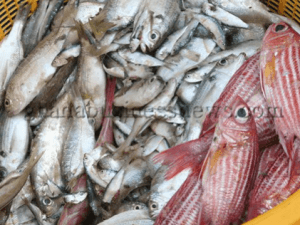Greater Accra Regional fishers deliberate on ending Saiko
 A Greater Accra Regional Dialogue on ending Saiko in Ghana was held in Accra on Wednesday with a resolve of the stakeholders to support state regulators on ending Illegal, Unregulated and Unreported (IUU) fishing practices.
A Greater Accra Regional Dialogue on ending Saiko in Ghana was held in Accra on Wednesday with a resolve of the stakeholders to support state regulators on ending Illegal, Unregulated and Unreported (IUU) fishing practices.
The fishers also expressed the need for the state to use the law to stop Saiko, a local name for illegal fish trans-shipments, in which industrial trawlers transfer frozen fish to specially adapted canoes for onward sale to local markets.
Through the Saiko practices, industrial trawlers do not only target the demersal (the bottom dwelling fish species for which they are licensed), but the same species for the artisanal fishing community, including the severely depleted small pelagic such as sardinella and mackerel.
Saiko catches are said to always contain juvenile fish that are landed by Saiko canoes, with severe implications for Ghana’s artisanal fishing sector, known to be critical to food security.
However, Saiko is prohibited under international and Ghana’s Fisheries laws, attracting a fine between I000 dollars and two million dollars respectively.
Speaking at the Dialogue, aimed at getting government and all stakeholders to commit to ending Saiko, Nana Joojo Solomon, the Executive Member of the Ghana National Canoe Fishermen Council (GNCFC), said presently many fishermen and fish mongers had been alerted on the dangers of Saiko and the threat it posed to the fisheries sector.
He said if Ghana did not increase efforts at ending saiko, very soon the international law on trans-shipment would be used on the country and may soon be flagged, against the background of the Sustainable Development Goals on life under the sea.
Nana Solomon said all the members of the National Fishers Association of Ghana and the Ghana Trawlers Association (GTA) were ready to support the national regulators to apply the law for the proper management of the sector.
He said the closed season alone could not help achieve the needed solutions to the dwindling fish stock currently being faced by the country.
He said Ghana had excellent laws and “so all we need is the enforcement of the law and commitment on the side of regulators.”
Mr Charles Smith, the Communications Manager of the Environmental Justice Foundation (EJF), said the Dialogue was organised in collaboration with Hen Mpoano, the GNCFC, Friends of the Nation, Care International, Oxfam Ghana, the Livestock and Fisheries Chamber, and the Careth Development Organisation.
He said the Dialogue, which would be held in other fishing regions, was to respond to the urgent need to collaborate with key stakeholders to identify specific actions needed to end Saiko and other forms of IUU.
It was also to build a consensus and provide the enabling environment for the Government to enforce the law on illegal trans-shipment as stated in the 2020 Budget.
This would help safeguard the livelihoods of the about 10 per cent of the population that engage in fishing and related activities.
Source: GNA
